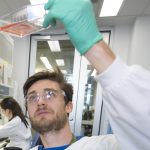
Professor Steve Wilton
Two new MS Research Australia incubator grants have been awarded for projects led by Professor Steve Wilton from Perth, and Dr Mark Stein from Melbourne. Incubator grants provide seed funding for the early stages of new research efforts, with the aim of generating preliminary data needed to support future grant applications. Incubator grants are awarded throughout the year with a value up to $25,000.
Professor Wilton, from Murdoch University, WA, received an MS Research Australia Incubator grant of $25,000 in October. Professor Wilton is the Foundation Chair in Molecular Therapy at the Centre for Comparative Genomics. Prof Wilton and his team will work on a project that will aim to develop alternative therapies for MS. Many therapies available at the moment are examples of monoclonal antibodies (antibodies that bind to one specific molecular target), which while they can be effective, can also have side effects. The team will develop an alternative method of blocking the activity of therapeutic targets using genetic technology known as antisense oligonucleotides and attempt to redirect processing of the gene message in a safe and efficient manner.
For more information on this project please see here.
Dr Stein, from the Royal Melbourne Hospital and Walter and Eliza Hall Institute of Medical Research also received an MS Research Australia Incubator grant of $24,560 in the October round. Dr Stein and colleagues will investigate hormones in the blood in relapsing remitting MS. This pilot study will examine levels of particular hormones in the blood of people with MS and compare them with measurements taken from healthy people. If hormonal dysfunction is identified, this may shed light on the mechanisms involved in relapsing remitting MS. If this proves to be a feature of the disease, levels of blood hormones could also provide biomarkers to track the disease development over time. Biomarkers would be particularly useful, for example, to identify people most at risk of developing MS and to target prevention strategies.
For more information please see here.






